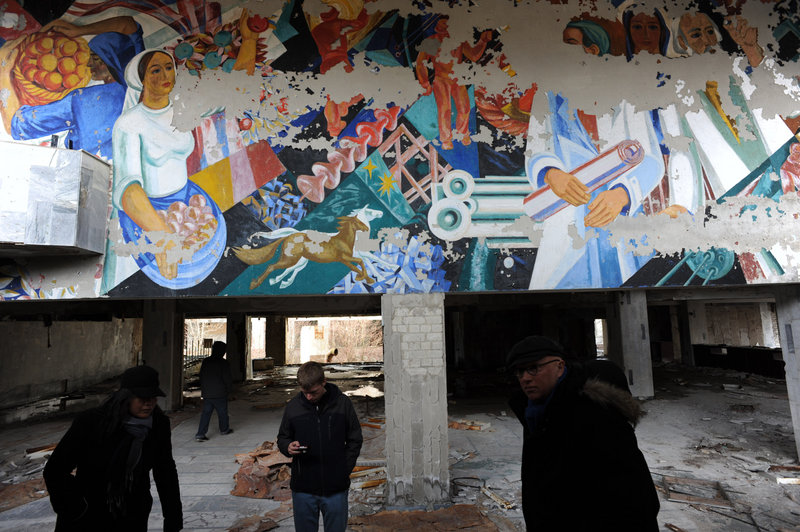KIEV, Ukraine — After Chernobyl, there was no turning back. The Soviet Union had already set out on its long road to collapse, but 25 years ago today, April 26, 1986, the explosion at reactor No. 4 marked the moment when control at the top, and faith at the bottom, began to unravel.
Even today, Ukrainians, who achieved independence five years after the disaster, remember the fear of radiation and of the unknown – but more pointedly, they remember their sense of betrayal.
Now they hear distant echoes of Chernobyl as Japan struggles, not always transparently, to deal with the Fukushima crisis. But the contrast with the Soviet response is stark.
Igor Zhdanov was a first-year university student here in the spring of 1986. April 26 came and went and no one seemed the wiser. Six days after the explosion, with only a small and inaccurate story about it in the papers, Communist Party officials went ahead with a big May Day parade down Kiev’s main street, the Kreshchatik, 70 miles from Chernobyl. Some of Zhdanov’s classmates marched together as a university contingent. It was a glorious day.
Five or six days later, a professor called him. “Why are you here? You’re done with your exams. Get out of Kiev,” he barked.
Zhdanov, who’d still been hearing only rumors, decided to go. He remembers how he got to the train station to find it jammed with people, a crowd on the edge of panic. Luggage was everywhere. He went to buy a ticket and the clerk shouted at him, “What are you talking about? Just get on a train!”
That’s how Zhdanov, who today runs a political think tank here, realized how bad the situation was – not how bad the radiation was, because there was still no information released on that, but how bad the reaction was.
The first real account didn’t appear in the press until a few days later. The scene at the train station, though, showed the power of the grapevine. People were saying that Communist leaders had gotten their families out of Kiev ahead of everyone else, and that Moscow had ordered the May Day parade to proceed despite the apparent danger.
In Pripyat, where Chernobyl’s workers lived, it was less of a secret. On April 27, residents encountered soldiers wearing gas masks. Anatoly Vinokur was an ambulance driver, among the first to respond to the disaster. He worked two shifts in a row. It nearly killed him.
His wife, Lyudmila, now 62, remembers asking him as he was being taken to the hospital why he hadn’t thought of his family before risking his life. “Don’t worry,” he told her. “The Motherland will take care of you.”
But she thinks the Motherland turned its back on them. It wasn’t just the authorities’ silence in the first two weeks. Official indifference became an enduring part of the Chernobyl story. As if they were lepers, no one wanted to hire the Vinokurs. Financial assistance they were entitled to usually fell short. Medical care, she feels, was inadequate, and doctors misleading. Her husband eventually got his old job back, at Chernobyl, rotating out every two weeks to limit his exposure to radiation. Today he’s an invalid.
In the summer of 1986, while he was at a Moscow hospital, they were told not to talk to reporters, especially foreigners. “We were great patriots back then,” she said. “But we were cheated. We were abandoned.”
Chernobyl’s legacy joined the great current of troubles afflicting the Soviet Union in its last days. On Dec. 1, 1991, Ukrainians overwhelmingly voted for independence. That was the irrevocable moment. By Christmas, the U.S.S.R. was history.
A fundamental legacy of Chernobyl, said Zhdanov, was the mistrust it sowed. It wasn’t the accident itself that embittered people, but the way the authorities handled it. Chernobyl made it clear that Moscow wasn’t going to look after Ukraine, and when a sea of other troubles descended, people remembered that one lesson.
Send questions/comments to the editors.



Success. Please wait for the page to reload. If the page does not reload within 5 seconds, please refresh the page.
Enter your email and password to access comments.
Hi, to comment on stories you must . This profile is in addition to your subscription and website login.
Already have a commenting profile? .
Invalid username/password.
Please check your email to confirm and complete your registration.
Only subscribers are eligible to post comments. Please subscribe or login first for digital access. Here’s why.
Use the form below to reset your password. When you've submitted your account email, we will send an email with a reset code.